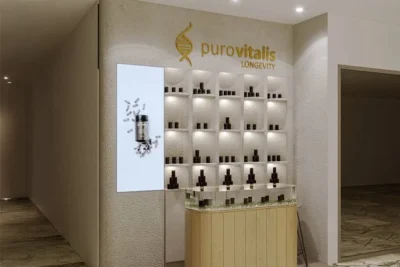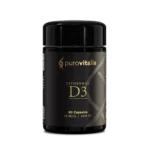
Aging is often seen as an inevitable process, but how we age is largely influenced by the choices we make. While the body undergoes changes over time, there are many ways to maintain strength, vitality, and overall well-being. One key factor is ensuring proper nutrient intake, and research suggests that vitamin D3 plays an essential role in supporting a healthy and active life. In this blog, we explore how maintaining optimal vitamin D3 levels can help preserve health, energy, and resilience at every stage of life.
What is vitamin D3?
Vitamin D3 is a fat soluble vitamin that controls almost 900 genes in the body. 1.1 billion people worldwide have vitamin D3 deficiency a disease related to age related diseases. Research shows that maintaining proper vitamin D3 levels can slow down aging and may increase life span. Body produces vitamin D3 naturally when skin is exposed to sun especially UVB rays. Dietary sources are fatty fish like salmon, mackerel and sardines, fish liver oil and fortified foods. Many opt for vitamin D3 supplements during periods of limited sun
Vitamin D3 and health
Vitamin D3 affects a wide range of health conditions by influencing many body systems. Adequate levels support various aspects of well-being, from the strength of our bones to the function of our heart and brain. Here are some key ways vitamin D3 contributes to health:
- Bone and muscle health: Helps maintain strong bones and proper muscle function, reducing the risk of fractures and weakness.
- Cardiovascular health: Supports heart function and the normal operation of blood vessels, contributing to balanced blood pressure.
- Brain and mood regulation: Plays a role in keeping the brain active and contributes to mood stability.
- Metabolic health: Assists in managing blood sugar levels, which is important for overall metabolic function.
- Immune and nerve support: Helps maintain a healthy immune system and proper nerve function.
Related: The link between vitamin D3 and the immune system
Vitamin D3 and healthy skin
Vitamin D3 is important for skin health as it supports cell renewal, barrier function, and immune defense. A study shows that the skin both produces and responds to vitamin D3, which helps with wound healing and inflammation control. Deficiency can weaken the skin’s ability to heal and increase the risk of conditions like psoriasis and atopic dermatitis. As natural production declines with age, diet and supplementation become essential for maintaining healthy levels.

Related: Liquid collagen benefits, dosage and possible side effects
Vitamin D3 and telomere length
Vitamin D3 plays a crucial role in reducing inflammation and protecting against DNA damage. Research suggests that optimal levels of vitamin D3 help maintain longer telomeres—the protective caps at the ends of chromosomes that shield DNA from damage. Since telomeres naturally shorten with age, ensuring sufficient vitamin D3 intake may help slow this process.
A study involving 2160 women aged 18 to 79 examined the relationship between vitamin D3 levels and telomere length in white blood cells, a key marker of cellular aging. The results showed that women with higher vitamin D3 levels had significantly longer telomeres than those with low levels, even when adjusted for factors like age, physical activity, and hormone use. The difference in telomere length between the highest and lowest vitamin D3 levels was equivalent to approximately five years of biological aging.
Shorter telomeres are linked to genomic instability and increased cell death, both of which contribute to aging and age-related diseases. The study suggests that maintaining adequate vitamin D3 levels may support cellular longevity by slowing telomere shortening, potentially reducing the risk of age-related decline.

You might also find this interesting: Lengthening telomeres and slowing aging: Promising study on NMN
Vitamin D3 and the immune system: Supporting healthy aging
Vitamin D3 helps regulate the immune system and may play a role in managing autoimmune diseases like type 1 diabetes and rheumatoid arthritis. A study of over 2,000 women found that vitamin D3 deficiency was linked to a higher risk of type 1 diabetes, while sufficient levels supported better immune function.
Since chronic inflammation accelerates aging, maintaining optimal vitamin D3 levels may not only protect against autoimmune diseases but also promote longevity and overall healthy aging.
Related: Clinical trial: Can omega-3, vitamin D, and exercise slow biological aging?
How much vitamin D3 do you need?
Vitamin D is essential for bone strength, muscle function, and immune health. The official recommendations vary by age:
- Infants and young children (0-4 years): 10 µg (400 IU) daily in the form of vitamin D drops.
- Children and adults up to 70 years: 15 µg (600 IU) daily.
- People over 70 years: 20 µg (800 IU) daily.
Many people choose a supplement of 25-50 µg (1000-2000 IU) daily, especially during winter months when sunlight exposure is limited.
How much vitamin D3 is too much?
To prevent overdosing, EFSA (European Food Safety Authority) and the National Institutes of Health (USA) have set an upper limit of >100 µg (4000 IU) per day for adults. Excessive intake over time can lead to elevated calcium levels in the blood, potentially causing health issues.
Signs of vitamin D deficiency
Vitamin D deficiency is common and can affect overall well-being. Symptoms may include fatigue, muscle weakness, joint pain, frequent illnesses, and mood changes like low energy or feeling down. In the long term, a deficiency can weaken bones and increase the risk of fractures.
Read our full blog about vitamin D deficiency here: Vitamin D deficiency: In-depth insights and solutions
Who is at risk of vitamin D deficiency?
Certain groups are more vulnerable to vitamin D deficiency, including:
- People with limited sun exposure – Those who spend most of their time indoors or live in regions with long winters.
- Older adults – The skin’s ability to produce vitamin D decreases with age.
- People with darker skin – Higher melanin levels reduce the skin’s vitamin D production.
- Individuals with obesity – Vitamin D can be stored in fat tissue, making it less available for the body to use.
- Pregnant and breastfeeding women – Increased vitamin D is needed for both mother and baby.
- People with certain medical conditions – Those with digestive disorders like Crohn’s disease, celiac disease, or kidney disease may have trouble absorbing vitamin D.
Test your vitamin D levels
Not sure if you’re getting enough vitamin D? With the Purovitalis Vitamin D Test Kit, you can easily measure your levels and receive personalised digital results within two weeks. This helps you adjust your intake based on your individual needs.

Sources of vitamin D3
Sunlight is the best natural source of vitamin D3, but getting enough can be challenging without excessive sun exposure. While some foods naturally contain vitamin D3, and others are fortified, it can still be difficult to meet daily needs through diet alone. That’s why many people choose vitamin D3 supplements.
The dietary sources of vitamin D3 include:
The main dietary sources of vitamin D3 include:
- Fatty fish (salmon, mackerel, sardines, tuna)
- Fish liver oil (such as cod liver oil)
- Egg yolks
- Liver (beef and poultry)
- Fortified foods (milk, orange juice, cereals, and plant-based alternatives)
- Cheese (small amounts)
Conclusion
Vitamin D3 is crucial for maintaining overall health and supporting healthy aging. It plays a key role in bone strength, muscle function, immune regulation, and even cellular aging by preserving telomere length and reducing inflammation. While sunlight is the best natural source, it can be difficult to get enough without overexposure. Some foods provide vitamin D3, but for many, supplements are the most reliable way to maintain optimal levels.
If you’re unsure whether you’re getting enough vitamin D3 or experiencing symptoms of deficiency, try the Purovitalis Vitamin D Test Kit to check your levels. Regular testing can help ensure you maintain the right amount to support longevity, strengthen immunity, and promote overall well-being at every stage of life.
References:
- https://www.ncbi.nlm.nih.gov/pmc/articles/PMC4399494/
- https://www.ncbi.nlm.nih.gov/pmc/articles/PMC4642156/
- Frontiers | The Effect of Vitamin D Supplementation on Rheumatoid Arthritis Patients: A Systematic Review and Meta-Analysis (frontiersin.org)
- https://www.ncbi.nlm.nih.gov/pmc/articles/PMC9671203/

Vitamin D3 2000 IU liposomal delivery maximum bioavailability Immune Enhancer
Strengthen your immune system and promote bone health with Liposomal Vitamin D3! Try it out!













